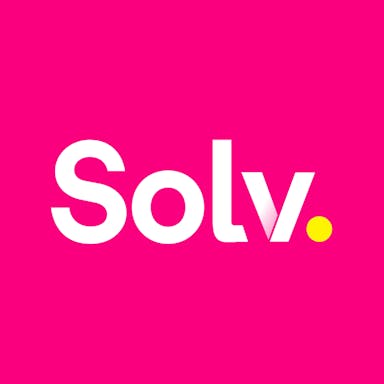Thesis
Reproductive and maternity healthcare in the US has become increasingly expensive, creating barriers to access. Between 2017 and 2021, the price of deliveries and childbirth hospital stays increased by 22%. As of July 2022, pregnancy, childbirth, and postpartum care averaged $18.8K in total costs, with out-of-pocket expenses averaging $2.8K for women enrolled in large group health plans. One-third of multi-person households and half of single-person households lacked the liquid assets needed to cover these out-of-pocket costs under private health plans, as of July 2022. The cost of fertility services further add to this financial strain. As of September 2023, 10% of women in the US aged 15 to 44 received fertility services. As of January 2025, the cost for a single cycle of In Vitro Fertilization (IVF) was around $15K to $20K, with an expected 5-10% price increase each year. Despite these increasing costs across fertility, pregnancy, and postpartum care, only 40% of US employers offered comprehensive fertility benefits in 2024.
Healthcare fragmentation between pregnancy and postpartum may also contribute to significant patient risks. While pregnant individuals receive structured prenatal care, the postpartum period reveals critical gaps in care coordination. As of December 2023, over one-third of women experience lasting health issues after childbirth, including physical complications like back pain (32%), urinary incontinence (8-31%), and pain during intercourse (35%), as well as mental health challenges such as anxiety (9-24%) and depression (11-17%). These conditions often require multiple specialists, yet 25% of new mothers lack basic provider contact information to follow up on concerns about themselves or their babies.
The bundled payment model, covering prenatal care through a single postpartum visit, disincentivizes extended care. This fragmented system contributes to alarming maternal health statistics. In 2022, 817 women in the US died from maternal causes, and as of 2021, over 60K women annually in the US experienced complications from pregnancy and delivery. Care coordination becomes further complicated by specialist shortages, with more than 35% of counties in the US lacking OB-GYN services or delivery hospitals, and challenges in transferring medical records across health systems, with 69% of providers reporting difficulties with EHR interoperability.
Maven Clinic is a virtual health clinic providing continuous care across fertility, pregnancy, parenting, pediatrics, mental health, and menopause. Maven Clinic works with employers and health plans to offer fertility, family-building, and mid-life employee and member benefits packages. Maven Clinic offers a web and app-based platform that gives its members access to providers from more than 30 specialties and 350 subspecialties, as of January 2025. Through its broad specialty and service coverage and its work with employers and health plans to offer benefits, Maven Clinic intends to create continuity in the care process and reduce out-of-pocket costs for patients.
Founding Story
Maven Clinic was founded in 2014 by Kate Ryder (CEO). Ryder graduated from the University of Michigan with a Bachelor's degree in English literature and political science and earned a Master's in Science in anthropology from the London School of Economics in 2008.
Ryder began her career in 2009 as a journalist for The Economist, covering technology and finance, which helped her learn about both innovation and healthcare. She later transitioned to venture capital in 2012, where she was an early-stage investor for Index Ventures. During her two years at Index, she concentrated on consumer technology investments, with a particular emphasis on the health, education, art, and retail sectors. The inspiration for Maven Clinic came as Ryder watched her friends navigate the complex experience of pregnancy and early parenthood with little support beyond traditional employer-provided parental leave.
When her friends started having children, Ryder observed a stark reality, commenting that:
“It’s one of the most pivotal healthcare moments. Many women were not just navigating the physical toll of childbirth but also experiencing an overwhelming lack of resources, which often led them to leave the workforce altogether.”
Witnessing how childbirth and parenthood significantly impacted women’s physical, and professional lives, she realized that the healthcare system failed to address these needs holistically. Ryder came to believe that providing comprehensive support during early family-building stages would create better downstream healthcare outcomes.
In the summer of 2013, Ryder began conducting focus groups in the US to better understand the challenges that arose when navigating pregnancy and family planning. By the fall of 2013, Ryder assembled the early Maven Clinic team, including the Director of Editorial and Community and the founding engineer. In December 2013, Ryder pitched her idea for a women’s virtual health clinic to Index Ventures partner Kevin Johnson and received a $50K investment. Ryder left her role at Index Ventures after two years to establish Maven Clinic in March 2014.
In the winter of 2014, Maven Clinic launched its digital health community for consumers and in April 2015, Maven Clinic’s virtual clinic launched with 300 providers. Shortly after, Maven Clinic began selling to employers and signed its first employer contract with the Clinton Foundation in early 2016.
In 2018, Maven Clinic hired Jason Lee (Chief Product Officer) as Senior Vice President of Product Management to build and scale Maven Clinic’s virtual care platform. Prior to joining Maven Clinic, Lee spent his career leading product teams at Yahoo where he led mobile product innovation from 2016 to 2017 and Nurx from 2018 to 2020, where he scaled its digital healthcare offering.
In 2021, Maven Clinic hired Dr. Neel Shah (Chief Medical Officer), a former professor at Harvard Medical School to lead clinical product strategy. Prior to joining Maven Clinic, Shah was an obstetrician-gynecologist at Beth Israel Deaconess Medical Center and an Assistant Professor at Harvard Medical School. He also founded Costs of Care, an NGO aimed at reducing healthcare costs, and co-founded the March for Moms Association, which advocates for maternal health and equity.
Product
Maven Clinic provides telemedicine services for pre-conception, pregnancy, mental health, pediatric care, postpartum support, and menopause. As of January 2025, Maven Clinic offered a web and app based platform to connect members with providers across more than 30 specialties and 350 subspecialties in over 35 languages across more than 175 countries.
Fertility and Family Building Services
Maven Clinic offers fertility and family-building services to support individuals and families through various reproductive needs. Services include natural conception support through a Trying-To-Conceive (TTC) coaching program, fertility testing, hormone treatments, medications, and assisted reproductive technologies like IVF and intra-uterine insemination (IUI). The platform also provides fertility preservation options, including egg and sperm freezing, and supports adoption, surrogacy, and male fertility through urology care. Additional services include PCOS management and mental health counseling related to fertility challenges.
Maven Clinic uses technology to improve care delivery. Secure video consultations with reproductive specialists are powered by WebRTC technology, and fertility tracking tools integrate with wearable devices to provide real-time data.
As of December 2024, among Maven Clinic members using fertility services, 30% conceived without assisted reproductive technology (ART). Of those undergoing IVF, 97% achieved singleton pregnancies, with an average of 2 cycles required to conceive. Among employees whose employers offered Maven Clinic’s fertility and family-building benefits, 96% reported increased loyalty to their employer, and 83% reported improved workplace productivity.
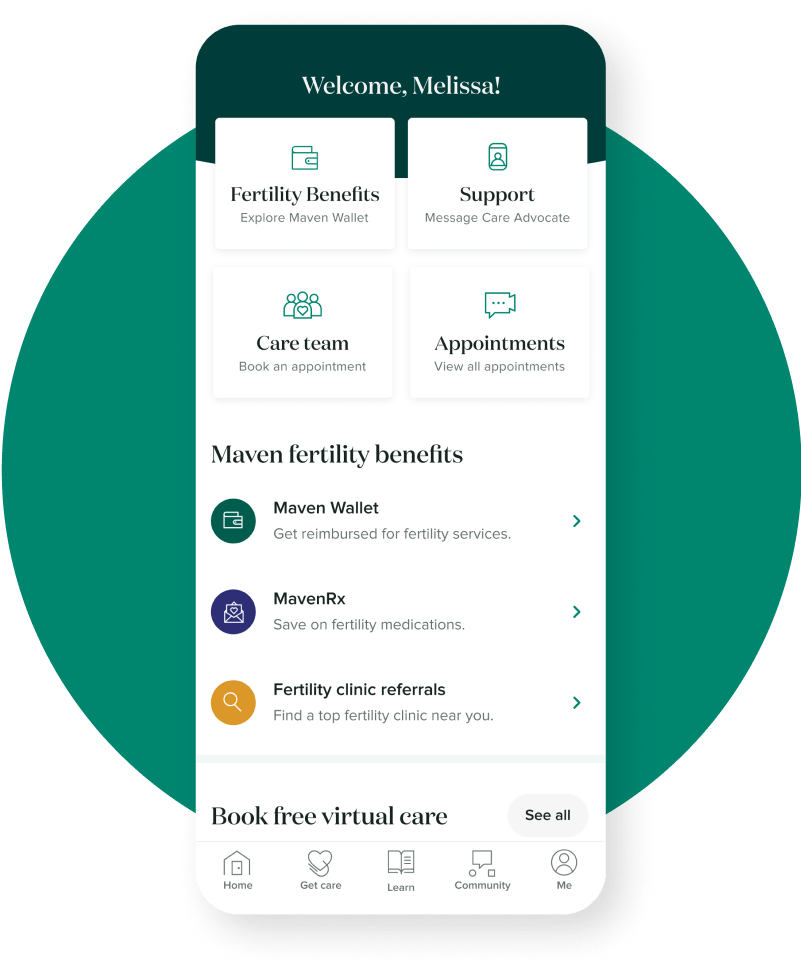
Source: Maven Clinic
Pregnancy and Maternity Care
Expecting mothers can access Maven Clinic's 24/7 telehealth platform, connecting them to providers across more than 30 specialties. The process starts with an onboarding assessment, where users share their due date, number of children, birthing preferences, pregnancy symptoms, and provider preferences. Based on their responses, a customized care team is formed, which may include an OB-GYN, doula, nutritionist, and mental health provider.
The Maven app also offers clinically-vetted articles on what to expect during pregnancy. As of January 2025, Maven members experienced up to 28% fewer NICU admissions and 20% fewer C-sections.
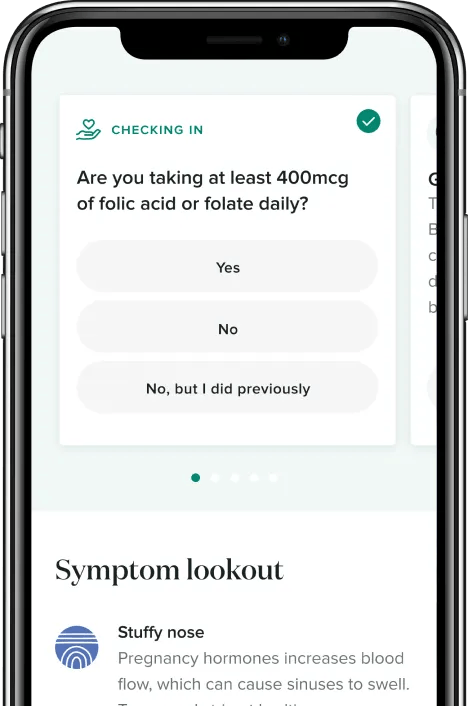
Source: Maven Clinic
Postpartum and Infant Care
Maven Clinic provides virtual postpartum care through OB-GYNs, doulas, lactation consultants, and mental health professionals, with 24/7 access to over 30 specialties. Tailored support includes high-risk care teams, referrals for in-person care, and postpartum plans addressing breastfeeding and mental health. Maven Clinic also offers Maven Milk to help mothers traveling for work ship temperature-controlled breast milk back home.
As of January 2025, members saw up to a 20% reduction in C-section rates, a 28% decrease in NICU admissions, and a 90% return-to-work rate compared to the national average of 57%. The platform also includes clinically vetted content, virtual classes, and resources to support parents.
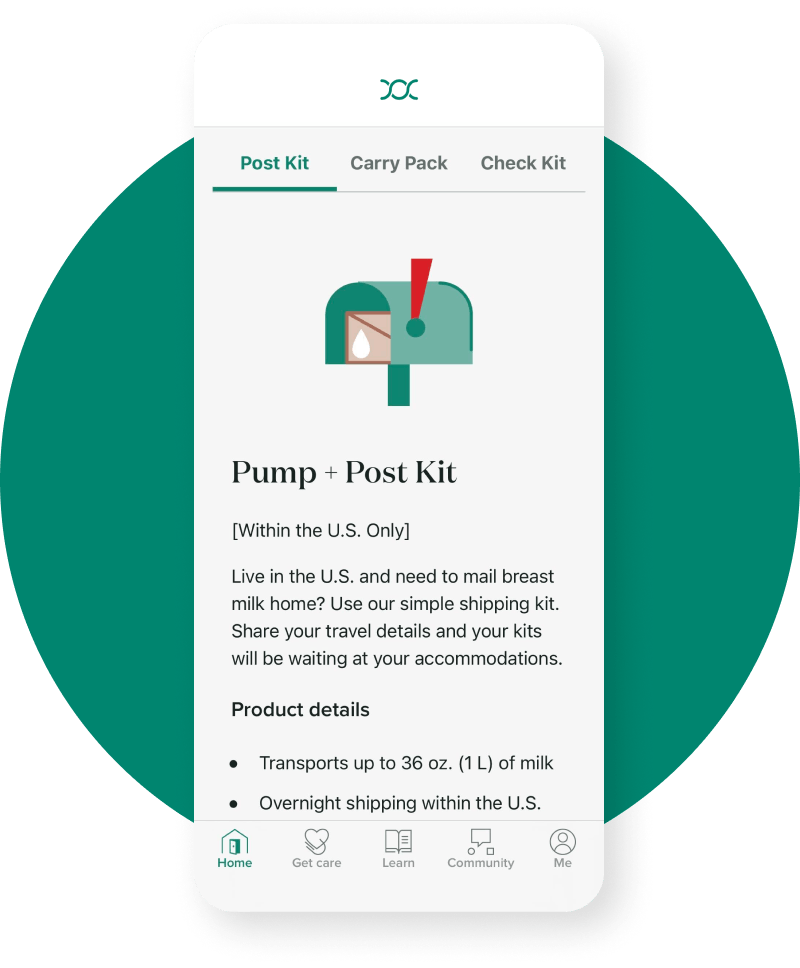
Source: Maven Clinic
Parenting and Pediatrics
Maven Clinic offers free, on-demand access to parenting coaches, speech pathologists, occupational therapists, special education advocates, and childcare consultants via video or messaging. A clinician-developed curriculum delivers daily lessons and behavioral coaching to improve parenting skills on topics like morning routines and sensitive discussions. Childcare support includes vetted providers such as daycares, sitters, and tutors, with reimbursement options through Maven Wallet. Maven Clinic’s parenting and pediatrics service provides support through a child’s first ten years.
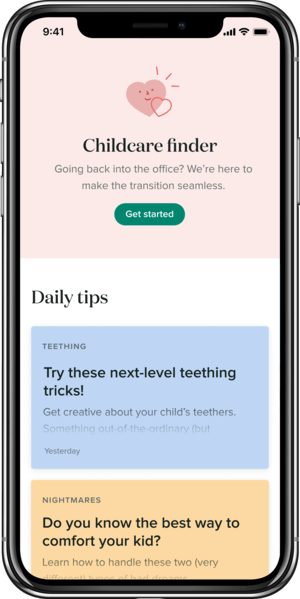
Source: Maven Clinic
Mental Health
Maven Clinic provides mental health support throughout the fertility, pregnancy, and parenting journeys. It connects members with mental health professionals who are available 24/7 to help members with issues like postpartum depression, fertility stress, and general mental health outcomes. Maven Clinic’s providers support members through video consultations and 1:1 mental health coaching. As of September 2023, 33% of Maven Clinic members reported that they could better manage their anxiety and depression and 40% of members reported finding emotional support through Maven Clinic’s mental health offerings.
Menopause and Midlife Health
In 2022, Maven Clinic began offering a dedicated program for menopause and ongoing care. Maven Clinic offers services like hormone management and sleep coaching and connects members with OB-GYNs, nurse practitioners, urologists, and naturopathic family physicians.
Maven Wallet
Maven Wallet is an expense management solution that simplifies financial support for employees’ fertility and family-building needs. Employers determine eligibility and configure coverage, offering either reimbursement-based options or the Maven Card — a debit-like card linked to employer-sponsored funds. The Maven Card helps members avoid out-of-pocket expenses within benefit maximums, providing access to services like fertility treatments, adoption, surrogacy, and childcare.
Members can use the Maven Clinic app to submit claims, track real-time benefit balances, and view claims status. As of June 2024, 57% of Maven Family Building clients utilize Maven Wallet for administering benefits. Maven also supports employers with benefit design, tax handling, payroll reimbursement, and utilization reporting.
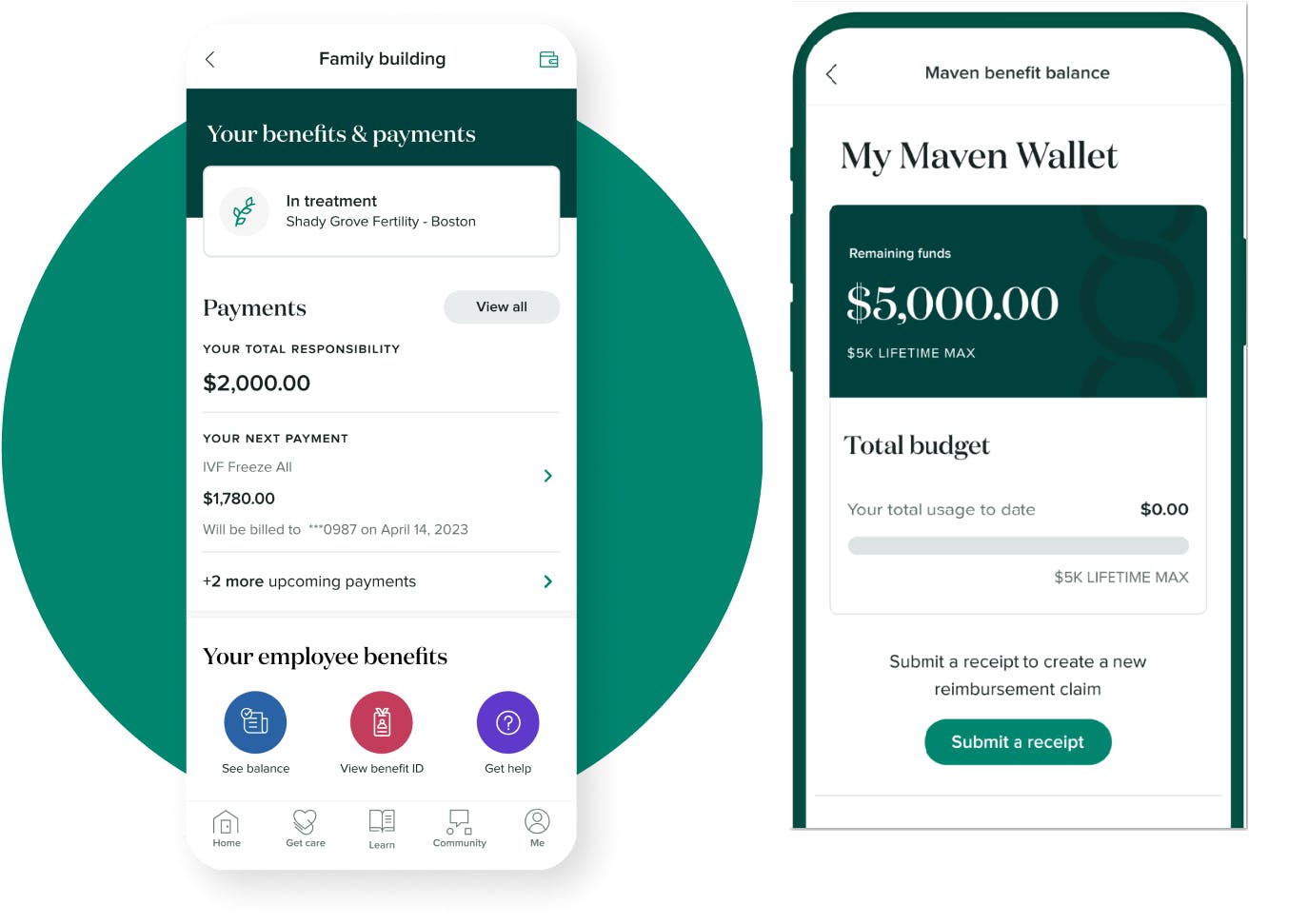
Source: Maven Clinic
Market
Customer
Maven Clinic serves employers, health plans, benefits providers, and individuals, including over 2K employers such as Amazon, Boston Scientific, SoFi, and Morgan Stanley. Employers increasingly value Maven Clinic for reducing costs and improving employee engagement, with 97% of women stating fertility benefits make companies more attractive. Maven Clinic also partners with health plans including Blue Cross Blue Shield of Michigan, Blue California, and Blue Cross Blue Shield of Massachusetts.
By October 2024, 75% of health plans, employers, and health systems had increased their digital health budgets over the last two years, with 40% investing in three to five digital health technologies and 43% investing in six or more technologies. Key focus areas include diabetes, mental health, primary care, cardiac care, and obesity, often through value-based contracts.
Maven also supports individuals and families outside employer plans, offering on-demand fertility, postpartum, and pediatric care. Approximately 30% of all Maven Clinic members identify as men.
Market Size
Maven Clinic, a provider of virtual health services spanning pre-pregnancy to pediatric care, operates across the fertility services, maternity care, postpartum care, and telehealth markets.
The US fertility services market was valued at $7.9 billion in 2022 and was projected to reach $16.8 billion by 2028. The maternity care market was valued at $42.1 billion in 2023 and was projected to grow at a CAGR of 6.8% from 2024 to 2032. The postpartum care market, valued at $2.4 billion in 2022, was expected to grow at a CAGR of 6.5% from 2023 to 2032. The US telehealth market, valued at $42.5 billion in 2024, was forecasted to expand at a CAGR of 23.8% from 2025 to 2030.
The broader US femtech market, encompassing technology-driven innovations in women's health — from virtual care platforms to wearables and software — was valued at $39.3 billion in 2024 and was anticipated to grow at a CAGR of 16.4% through 2030. This growth reflects increasing demand for women’s healthcare solutions, driven by the rising adoption of digital health technologies and advancements in AI and virtual assistants, enabling more personalized and accessible care. Average deal sizes for women’s health companies have also grown significantly, doubling from $5 million in 2020 to $10.7 million in 2025, further highlighting the sector's expansion and investment potential.

Source: Forbes
Competition
Maven Clinic's competitors operate primarily in the fertility care market or in the maternity and postpartum care markets. Maven Clinic's ability to differentiate itself from other reproductive and maternity health platforms and clinics will depend on maintaining the quality of its full-spectrum care and expanding into global markets to capture a larger user base.
Fertility Care
Kindbody: Kindbody, founded in 2018, offers a combination of in-person clinics and digital platforms for fertility and family-building services. Its offerings include egg freezing, IVF, and gynecological care, with a focus on serving employers to provide benefits packages. Kindbody raised $100 million in funding through a Series D round in March 2023, bringing its total funding to $290 million and valuation to $1.8 billion as of January 2025. Notable investors include Google Ventures, Perceptive Advisors, and RRE Ventures. Unlike Maven Clinic’s virtual-first platform, Kindbody operates a hybrid care model, integrating both physical clinics and Telehealth services. This allows Kindbody to offer in-person services for procedures like lab tests, hormone assessments, and ultrasounds, which require a physical presence.
Carrot Fertility: Founded in 2016, Carrot Fertility focuses on fertility and family-building benefits for employers, covering services like egg freezing, IVF, adoption, surrogacy, and hormone therapy. In August 2021, Carrot Fertility raised $75 million of Series C funding from investors including CRV, US Venture Partners, and F-Prime Capital. Unlike Maven Clinic, Carrot Fertility requires members to be enrolled through their employer or health plan to access its services.
Progyny: Progyny was founded in 2008. The company provides fertility, family building, and women’s reproductive health benefits for employers. Services covered include IVF, IUI, adoption, surrogacy, pregnancy care, postpartum care, return to work support, and menopause care. Progyny IPO’d in 2019 and as of January 2025 had market capitalization of $1.88 billion. Prior to its IPO, Progyny had secured funding from investors like TPG and Kleiner Perkins.
Maternity and Postpartum Care
Pomelo Care: Founded in 2021, Pomelo Care connects users with healthcare professionals through virtual consultations and personalized health plans to provide digital pregnancy and postpartum care. The company raised $46 million in Series B funding in June 2024 from investors including First Round Capital and Andreessen Horowitz, bringing its total funding to $79 million as of January 2025. Pomelo’s focus on pregnancy and postpartum care contrasts with Maven Clinic’s broader platform, which extends beyond postpartum care to further include fertility, early pediatric, mental health, and menopausal and midlife care.
Business Model
Maven Clinic operates a business-to-business-to-consumer (B2B2C) model, partnering with employers and health plans to provide virtual healthcare services for employees and their families.
For employers, Maven Clinic’s pricing structure includes a combination of fixed and variable fees:
Implementation Fee (One-Time): This fee covers the technical setup and communication strategy for launching the service and scales with the eligible population size.
Platform Access Fee (Annual): A fixed annual fee to provide access to all eligible members, also based on the population size.
Per-Enrollee Variable Fee: Employers are charged monthly for each enrolled member, covering the costs of providing care to individuals.
These tiers allow Maven Clinic to customize its services based on company size and workforce needs. Maven Clinic does not make public the specific fees for these employer plans.
For individual consumers who are not part of a health plan or employer, Maven Clinic offers direct-to-consumer pricing options that individuals can book on an as-needed basis:
Traction
As of January 2025, Maven Clinic’s services were utilized by 2K health plans and employers across 175 countries, including companies like Microsoft, and Morgan Stanley, alongside health plan partners such as Blue CrossBlue Shield. In 2024, the platform supported over 17 million members globally and offered 5.1K weekly appointment slots through its provider network, maintaining a 96% client retention rate.
Maven Clinic continued to expand internationally through a 2022 partnership with Indira IVF, India’s largest fertility provider, and a 2023 acquisition of Naytal, integrating UK-based providers into its network. By 2024, it had formed over 400 corporate partnerships across industries.
In September 2024, Amazon switched from Progyny to Maven Clinic as its primary fertility benefits provider. However, in November 2024, the company announced a 10% workforce reduction following its Series F funding round.
In December 2024, Maven Clinic became the first women’s health company to earn NCQA Health Equity Accreditation. Its equity-focused initiatives included increasing diversity among practitioners, with 40% identifying as members of underrepresented racial groups and 11% as LGBTQIA+.
Valuation
Maven Clinic raised $125 million in a Series F round led by StepStone Group in October 2024. This brought Maven Clinic’s total funding to $437 million, where it remains as of January 2025, with a post-money valuation of $1.7 billion. Maven Clinic has attracted funding from investors including Sequoia Capital, Oak HC/FT, Dragoneer Investment Group, Lux Capital, and Bond.
Maven Clinic competes with a range of publicly traded companies in the telehealth and maternity care space. Public competitors include Progyny (NASDAQ: PGNY), a fertility and family-building benefits management company serving employers and individuals, and Owlet (NYSE: OWLT), which specializes in connected health monitoring for infants. Other competitors include Hims & Hers Health (NYSE: HIMS), which offers reproductive and sexual health prescriptions and services, and Amwell (NYSE: AMWL), a leading telehealth platform. While Hims & Hers has seen an 11.5% stock growth from May to November 2024, both Progyny and Amwell have experienced declines.
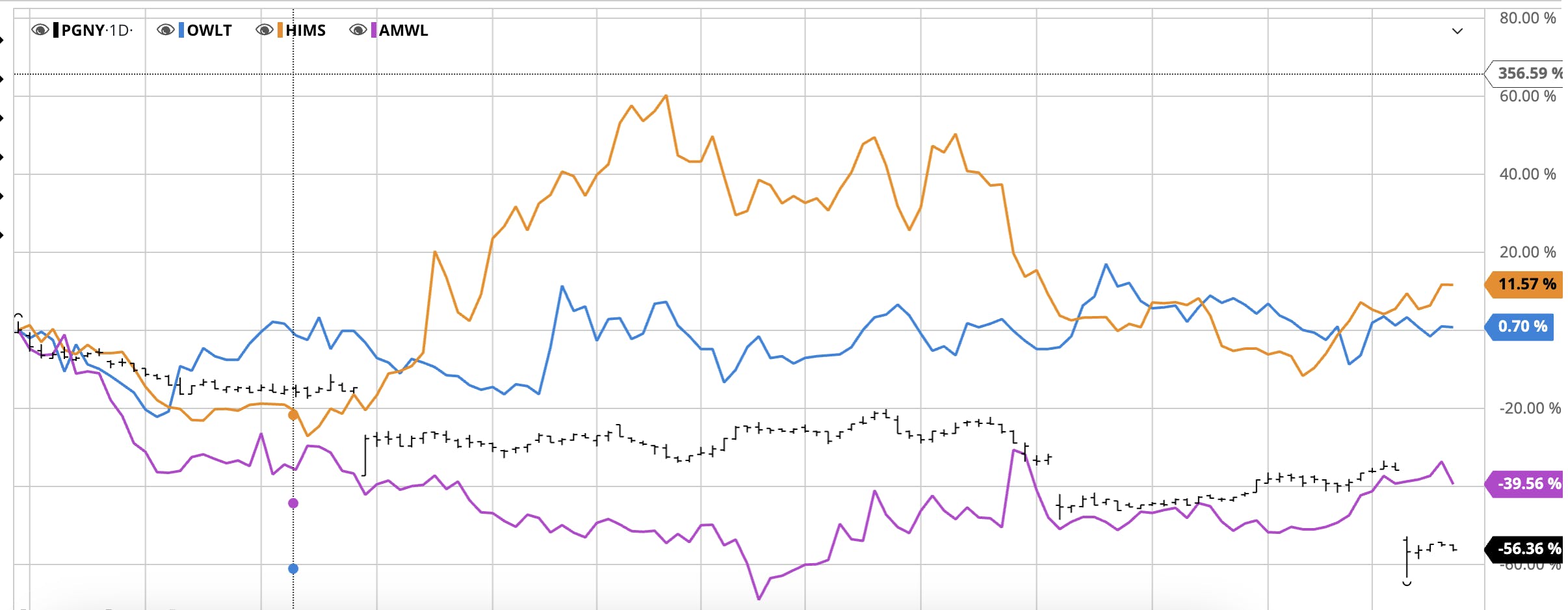
Source: Barchart
Key Opportunities
Leveraging AI and Machine Learning for Personalized Care
Maven Clinic uses a digital platform to provide healthcare services but has the opportunity to use AI and machine learning (ML) to improve the accessibility and personalization of its services. By integrating AI/ML, Maven Clinic could better predict users’ healthcare needs, improve care outcomes, and offer tailored health plans based on individual data. This would increase user retention and differentiate it from competitors.
For example, Maven Clinic could use ML-driven natural language processing (NLP) to analyze patient-provider interactions during telehealth sessions and identify recurring concerns, suggest follow-up questions, and flag potential mental health issues based on speech patterns and sentiment analysis, helping providers make more informed decisions in real time. Maven Clinic could also consider introducing self-service AI tools, like Nigerian femtech company Clafiya which uses AI in its free symptom checker to assist patients in evaluating their symptoms.
Given that the global healthcare AI market was projected to grow at a CAGR of 38.5% from 2024 to 2030, the usage of AI and ML technology could allow Maven Clinic to enhance its service delivery, scale more efficiently, and reduce operational costs.
Expanding into Global Markets
Maven Clinic has established a presence in the US and Europe but has opportunities for international expansion into high-population regions like India, China, Southeast Asia, and Nigeria. Its acquisition of Naytal, a UK health startup, demonstrates the potential for international growth.
Strategic expansion could involve acquiring companies like Cloudnine in India or Clafiya in Nigeria, which would expand maternal and neonatal care offerings, integrate telehealth services with physical infrastructure, and improve healthcare accessibility in underserved markets. The global femtech market, valued at $28 billion in 2024, was projected to reach $60 billion by 2027. By partnering with regional healthcare providers and adapting its digital platform, Maven Clinic can continue to capture market share internationally.
Key Risks
Increased Competition in FemTech and Maternity and Fertility Space
The FemTech industry, especially the maternal care support and services subsection, is becoming increasingly competitive. Companies like Progyny and Kindbody offer similar fertility and maternity services, alongside emerging early-stage startups like Pomelo Care. This growing competition could make it harder for Maven Clinic to secure contracts with employers and attract individual members.
To avoid potential market share erosion, Maven Clinic must continue differentiating its services through innovation, personalization, and global expansion. As venture capital investment in FemTech continues to grow, newly funded startups have the resources to innovate, putting pressure on more established companies like Maven Clinic.
Regulatory and Data Privacy Concerns
Managing sensitive patient health data comes with significant risks, particularly as data privacy regulations become more stringent globally. Laws such as HIPAA in the US and GDPR in Europe require meticulous compliance, and any mishandling of sensitive information could result in severe legal repercussions, including hefty fines and incarceration, with fines ranging from $141 to $2.4 million, as of January 2025. For Maven Clinic, which operates in more than 350 countries, ensuring robust data security measures is critical to maintaining trust with both employers and individual consumers. Failure to comply with evolving regulations could severely impact the company's growth prospects and market credibility.
Summary
Maven Clinic is a virtual health platform offering services across fertility, pregnancy, postpartum, pediatric, mental health, and menopause care. Through partnerships with employers and health plans, Maven has expanded its reach to millions of users across 175 countries, providing virtual appointments in over 30 specialties and 350 subspecialties.
Key growth opportunities for Maven include expanding into underserved international markets and leveraging AI to enhance its product offerings and personalize care. However, the company must navigate increasing competition in the FemTech space and growing regulatory scrutiny on data privacy. To sustain its growth, Maven must prioritize global market expansion while ensuring robust compliance with international health regulations.


